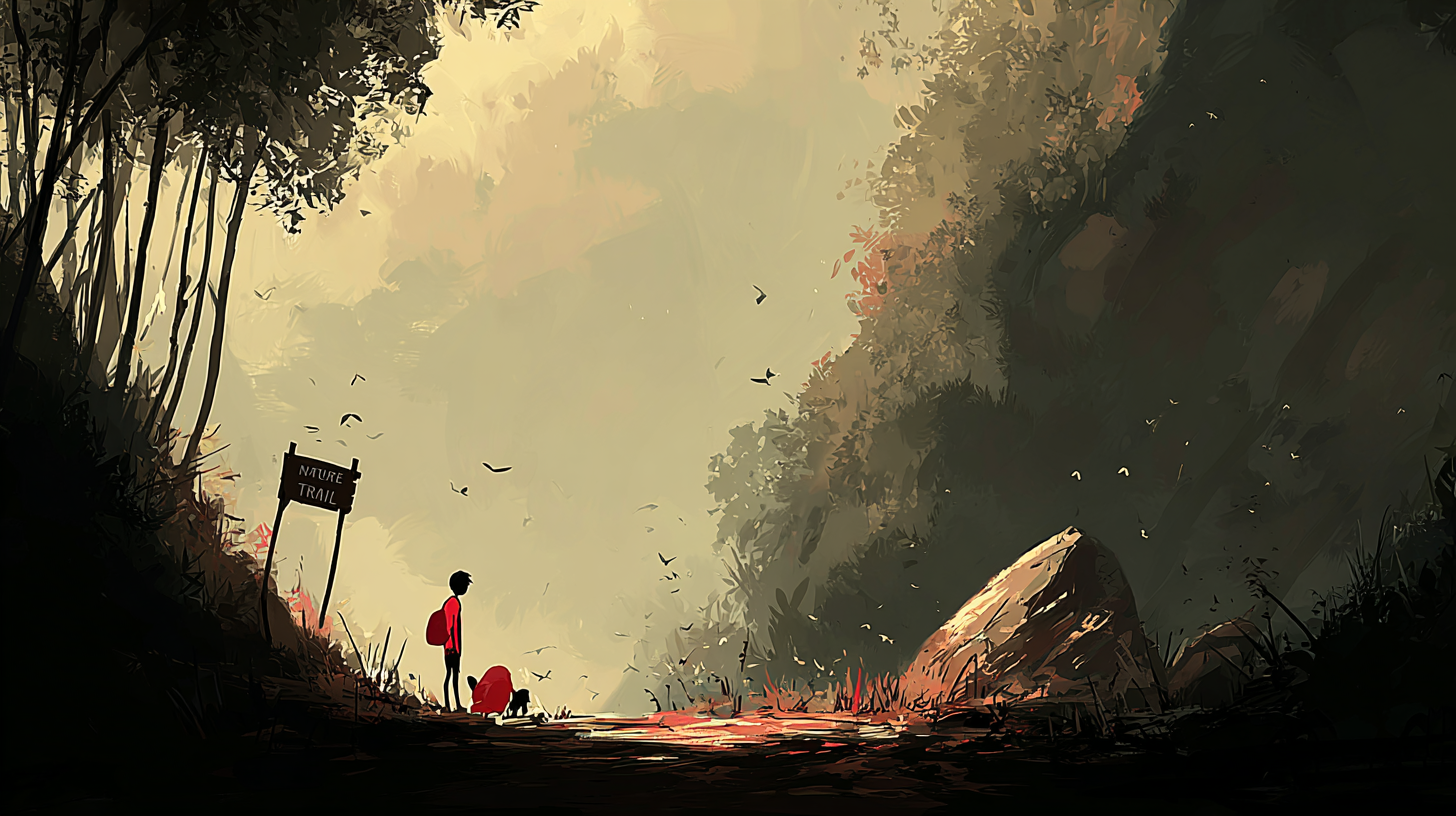“Trail” means a small path or to follow someone from behind.
「trail」は、山や森の中などにある「小道」や「あと(跡)」、または「後をつける」ことを意味します。
以下は英単語 “trail” に関するストーリー型学習コンテンツです。まずは大枠の意味を理解して最後の文章で確認しましょう。
主な意味(main meaning)
| 品詞 | 定義(英語) | 発音記号 | 英語例文 |
|---|---|---|---|
| 名詞 | A path or track, especially in nature | /treɪl/ | We followed the mountain trail to the top. |
| 動詞 | To follow or lag behind | /treɪl/ | She trailed behind the group because she was tired. |
語源(etymology)
「trail」は古フランス語 trailler(引きずる)から来ており、「何かがあとを引く・続く」イメージを持っています。物の跡、小道、または誰かの後をついていく動作に通じます。
類義語(synonyms)
| 類義語 | 英語例文 |
|---|---|
| path | The path through the forest was narrow but beautiful. |
| track | The hikers followed the dirt track to the lake. |
| route | We chose a scenic route for our road trip. |
| trace | The police found a trace of the suspect in the woods. |
| follow | He tried to follow the car without being noticed. |
反義語(antonyms)
| 反義語 | 英語例文 |
|---|---|
| lead | She leads the team with confidence. |
| advance | The soldiers advanced through the enemy lines. |
コロケーション(collocations)
| コロケーション | 英語例文 |
|---|---|
| hiking trail | The hiking trail goes through a beautiful forest. |
| trail behind | He trailed behind the others on the way up the hill. |
| nature trail | We walked along the nature trail and saw birds. |
| trail of smoke | A trail of smoke rose from the chimney. |
| leave a trail | The thief left a trail of footprints in the mud. |
2項表現(binomials)
| 2項表現 | 英語例文 |
|---|---|
| trial and error | We solved the problem by trial and error. |
| wear and tear | The shoes showed signs of wear and tear after the hike. |
英語ストーリー(english story)
Title: The Missing Backpack
Tom works at a nature center where he often helps visitors find hiking trails. One Saturday, a family reported that they had lost a backpack while walking along the nature trail. Tom decided to help. He followed the trail of footprints and noticed a trail of snack wrappers leading into the woods.
As he walked, he tried not to trail behind too much because he didn’t want to lose the path. He remembered that finding something lost often requires trial and error, and he checked different spots along the hiking trail.
After about an hour, Tom finally saw the backpack near a rock. It seemed the wind had blown it off the path. He picked it up and returned it to the family, who were very grateful.
Tom smiled. It was just another day helping people enjoy nature—one trail at a time.
和訳
タイトル:なくなったリュックサック
トムは自然センターで働いていて、よく訪問者に**ハイキングコース(hiking trail)を案内しています。ある土曜日、家族が自然遊歩道(nature trail)**を歩いている間にリュックをなくしたと報告しました。トムは手伝うことにしました。
彼は**足跡の跡(trail of footprints)を追い、さらにスナックの包み紙の跡(trail of snack wrappers)**が森の中に続いているのを見つけました。
歩きながら、あまり**遅れて歩かない(trail behind)ように気をつけました。道を見失いたくなかったからです。彼は、何かを見つけるには試行錯誤(trial and error)**が必要だと考え、**ハイキングコース(hiking trail)**のいろいろな場所を調べました。
1時間ほどして、トムは岩の近くにリュックを見つけました。風で道から飛ばされたようです。彼はそれを拾って家族のもとに戻し、とても感謝されました。
トムは笑顔になりました。人々が自然を楽しむのを助けるのは、いつもと変わらない一日でした。
Q&A
- Q「trail」と「path」の違いは?
- A
「trail」は自然の中にできた細い道を指すことが多く、ハイキングや登山などの場面で使われます。「path」はもっと広く使われ、公園や学校の中の小道など、自然だけでなく整備された道も含まれます。
- Q「trail」と「track」の違いは?
- A
「track」は車や動物、人が通った後にできる「跡」や「踏みならされた道」の意味があり、特に列車の線路や競技場のトラックなど人工的な道にも使われます。「trail」はもっと自然な道や足跡のイメージです。
- Q「trail」と「route」の違いは?
- A
「route」は出発地点から目的地までの「経路」や「道順」を表します。地図上で示されることが多く、抽象的な道も含みます。「trail」は実際に歩ける細い道や足跡に限定されます。
- Q「trail」と「trace」の違いは?
- A
「trace」は非常にかすかな「痕跡」や「残りもの」を表します。たとえば「犯人の痕跡」などで使われます。「trail」ははっきりとした道や跡が見える場合に使います。
- Q「trail」と「follow」の違いは?
- A
「follow」は「ついていく」という動作そのものを表します。「trail」はその動作を遅れてする、または跡をたどるというニュアンスがあり、少し距離がある感じです。
- Q「trail」と「hiking trail」の違いは?
- A
「hiking trail」はハイキング用に整備された自然の小道を指します。「trail」はそれ自体が小道を意味し、「hiking trail」はその中でも特にハイキングに適した道を強調しています。
- Q「trail」と「trail behind」の違いは?
- A
「trail」は名詞や動詞として広く使えますが、「trail behind」は特に「後ろについていく」「遅れてついていく」という意味で、動作に焦点を当てた句動詞です。
- Q「trail」と「nature trail」の違いは?
- A
「nature trail」は自然観察や散策のために作られた小道を指します。「trail」は一般的な小道を指しますが、「nature trail」は教育的・観光的な目的が含まれます。
- Q「trail」と「trail of smoke」の違いは?
- A
「trail of smoke」は「煙の跡」を意味する表現で、「trail」はこの場合「細く続く跡」や「流れ」を意味します。「trail」単体では道を意味しますが、ここでは「跡」という意味が強調されています。
- Q「trail」と「leave a trail」の違いは?
- A
「leave a trail」は「跡を残す」という意味の表現です。「trail」が「跡」そのものを指すのに対して、「leave a trail」はその行為(跡を残す)に焦点を当てた表現です。



コメント